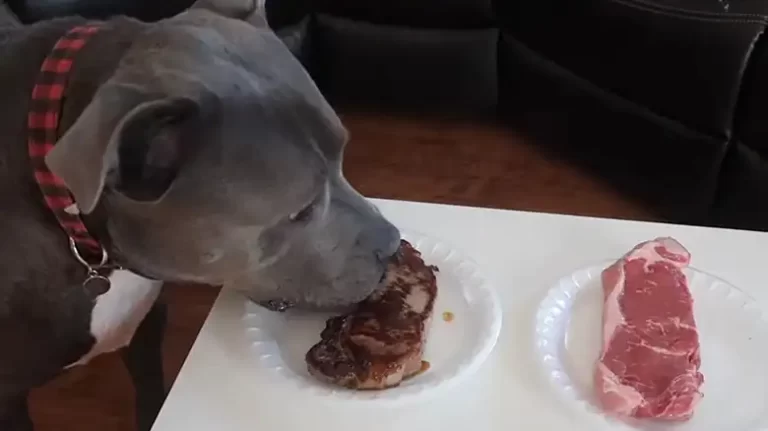Can Cats Eat Beef Jerky
When it comes to our feline companions, their dietary needs and restrictions are of utmost importance. Cat owners often wonder about what human foods are safe to share with their furry friends. Beef jerky, with its savory aroma and satisfying crunch, is a popular snack enjoyed by many.
But can cats eat beef jerky safely, or does it pose potential risks to their health? In this article, we’ll delve into the world of cats’ dietary needs and explore the potential risks and benefits of feeding them beef jerky.

Cats’ Dietary Needs
Cats have unique dietary requirements that play a crucial role in their overall health and well-being. Understanding what cats need in their diet is essential for responsible pet ownership. Here, we’ll explore the basic dietary needs of cats, ensuring you’re well-informed about what’s best for your feline friend.
Protein: The Foundation of a Cat’s Diet
Protein is the primary building block of a cat’s diet. It is essential for maintaining healthy muscles, tissues, and various metabolic processes. Cats are obligate carnivores, which means their diet heavily relies on animal-based protein.
Learn how to provide your cat with the right amount of protein they need to thrive.
Fats: A Source of Energy
Dietary fats are another important component of a cat’s nutrition. They provide a concentrated source of energy, support healthy skin and coat, and aid in the absorption of fat-soluble vitamins. Discover the role of fats in your cat’s diet and how to ensure they receive the appropriate fat content.
Carbohydrates: Limited Tolerance
Cats have a limited ability to digest and utilize carbohydrates. Their natural diet in the wild consists of very few carbohydrates, making them less tolerant to this nutrient. Learn why it’s essential to manage the carbohydrate content in your cat’s diet to prevent potential health issues.
Essential Nutrients: Vitamins and Minerals
Vitamins and minerals are vital for a cat’s overall health. They play a role in various physiological processes and support immune function. Understand the specific vitamins and minerals that are crucial for your cat’s well-being and how to incorporate them into their diet.
Hydration: The Importance of Water
Cats are notorious for being finicky drinkers, which can lead to dehydration. Learn why proper hydration is critical for cats and how to encourage them to drink more water. Discover the role of moisture in their diet and how to meet their hydration needs effectively.
Dietary Restrictions: What to Avoid
Just as important as knowing what to include in your cat’s diet is understanding what to avoid. Some human foods can be toxic to cats, leading to serious health issues. Get a list of foods that should never be a part of your cat’s diet to ensure their safety and well-being.
Potential Risks
When considering whether it’s safe for your feline friend to munch on beef jerky, it’s essential to be aware of the potential risks associated with this popular human snack. Here, we’ll dive into the potential hazards that come with offering beef jerky to your cat.
High Salt Content
One of the primary concerns when it comes to cats and beef jerky is the high salt content. Beef jerky is typically seasoned with salt during its preparation. While we may enjoy the salty flavor, excessive salt intake can be harmful to your cat.
Cats are sensitive to sodium, and too much salt can lead to health problems such as dehydration, increased blood pressure, and kidney issues.
Preservatives and Additives
Commercially produced beef jerky often contains preservatives and additives. These substances are included to extend the jerky’s shelf life and enhance its flavor.
However, they can be problematic for cats. Some cats may be sensitive or allergic to these additives, leading to digestive problems, allergies, or other adverse reactions.
Choking Hazard
The texture of beef jerky is tough and chewy, which can present a choking hazard, especially for cats that tend to eat quickly without much chewing. Large pieces of jerky can get stuck in your cat’s throat, leading to distressing situations.
If you decide to give your cat beef jerky, it’s crucial to cut it into small, manageable pieces to minimize this risk.
Digestive Upset
Cats have sensitive digestive systems, and introducing new or unfamiliar foods can lead to gastrointestinal upset.
The richness of beef jerky, combined with its seasoning and texture, can cause digestive discomfort, including diarrhea or vomiting. It’s important to monitor your cat’s response to beef jerky closely.
Obesity Concerns
Feeding your cat high-calorie treats like beef jerky can contribute to obesity, a growing issue in domestic cats. Obesity can lead to various health problems, such as diabetes, arthritis, and heart issues. It’s essential to maintain a balanced diet for your cat to avoid these potential complications.
Can Cats Consume Beef Jerky?
In the quest to find suitable treats for our feline companions, the question often arises: Can cats eat beef jerky? After all, cats are natural carnivores, and beef jerky is, well, meat.
While it’s true that cats have a strong affinity for meat, the consumption of beef jerky by your furry friend isn’t as straightforward as it may seem. Let’s explore why beef jerky may not be the ideal choice for your cat and what you should consider when contemplating this snack.
Cats, Carnivores by Nature
Before diving into the topic of beef jerky, it’s essential to understand that cats are obligate carnivores. This means their bodies are specifically adapted to a diet primarily consisting of animal-based proteins.
In the wild, they thrive on a diet of small prey, and this evolutionary history still influences their dietary needs.
The Pitfalls of Beef Jerky
While cats undeniably enjoy the taste of meat, the kind of beef jerky intended for human consumption may not be the best choice for them. Here are some reasons why:
High Salt Content
One of the primary concerns is the high salt content in most commercial beef jerky. Excessive salt intake can lead to issues such as dehydration, increased blood pressure, and kidney problems in cats.
Therefore, it’s crucial to be mindful of the salt levels in any beef jerky you might consider sharing with your pet.
Preservatives and Additives
Many store-bought beef jerky products contain preservatives, artificial flavors, and other additives that could potentially harm your cat. These substances may lead to allergies, digestive problems, or other adverse reactions.
Always check the ingredient list before offering your cat any human food, including beef jerky.
Choking Hazard
The tough and chewy texture of beef jerky can pose a choking hazard, particularly for cats that tend to eat quickly without much chewing. If you decide to share a bit of beef jerky with your cat, ensure it’s in small, manageable pieces to prevent choking incidents.
Moderation is Key
While the potential risks associated with beef jerky are clear, there’s still room for moderation. If you’re determined to offer your cat a taste of beef jerky, remember these guidelines:
Keep it minimal: A small, infrequent portion is the key. This should only be an occasional treat, not a regular part of their diet.
Homemade options: Consider making homemade beef jerky for your cat. This way, you can control the ingredients and minimize the salt content, making it a safer choice.
In Doubt? Consult Your Veterinarian
When it comes to your cat’s well-being, it’s always best to consult with a veterinarian. If you have any doubts or concerns about whether it’s safe to feed your cat beef jerky, seek professional advice. Your veterinarian can provide you with tailored guidance based on your cat’s specific needs and health.
Recurring Questions
1. Can I give my cat beef jerky as a treat?
Answer: While a small amount of beef jerky is unlikely to harm your cat, it’s not an ideal treat choice. Commercial beef jerky can have high salt content and additives that might be harmful to your cat’s health. It’s better to choose cat-specific treats.
2. What are the risks of feeding my cat beef jerky?
Answer: The primary risks associated with beef jerky for cats include its high salt content, potential additives that could trigger allergies or digestive issues, and the choking hazard due to its tough texture.
3. Can I make homemade beef jerky for my cat?
Answer: Yes, making homemade beef jerky for your cat is a safer option. You can control the ingredients and limit the salt content, making it a more suitable treat. Just ensure it’s in small, cat-sized pieces to prevent choking.
4. How much beef jerky can I give my cat?
Answer: Moderation is key. If you choose to give your cat beef jerky, a tiny portion as an occasional treat should suffice. Avoid making it a regular part of their diet to prevent potential health issues.
5. What should I do if my cat accidentally eats a large amount of beef jerky?
Answer: If you suspect your cat has consumed a significant quantity of beef jerky, contact your veterinarian immediately. They can assess the situation and recommend appropriate measures to ensure your cat’s well-being.
6. Are there better treat options for my cat?
Answer: Yes, there are many cat-friendly treat options available on the market. Look for treats specifically designed for feline dietary needs, and consult your veterinarian for recommendations.
7. Why are cats considered obligate carnivores?
Answer: Cats are considered obligate carnivores because their bodies are designed to thrive on a diet primarily composed of animal-based proteins. Their evolutionary history as hunters has shaped their nutritional requirements.
8. What are the signs of salt poisoning in cats?
Answer: Signs of salt poisoning in cats may include increased thirst, urination, vomiting, diarrhea, lethargy, and in severe cases, seizures. If you suspect salt poisoning, seek immediate veterinary care.
9. Can I give my cat any type of meat as a treat?
Answer: While many cats enjoy meat, not all types are safe. Avoid processed or heavily seasoned meats like sausages, bacon, or deli meats. Stick to plain, cooked meats in moderation if you want to offer your cat a meaty treat.
10. Should I consult my vet before introducing new treats into my cat’s diet?
Answer: Yes, it’s a good practice to consult your veterinarian before introducing any new treats into your cat’s diet. Your vet can offer guidance on suitable treats that align with your cat’s specific dietary needs and health considerations.
Conclusion
In conclusion, while cats are obligate carnivores and enjoy the taste of meat, beef jerky isn’t an ideal treat for them due to its high salt content, potential additives, and choking risk. Prioritizing a well-balanced cat food that meets their nutritional needs is the best way to ensure their long-term health and well-being.
Always consult your veterinarian before introducing any new food into your cat’s diet to make informed decisions about their nutrition and safety. Remember, your cat’s health should always be the top priority.

